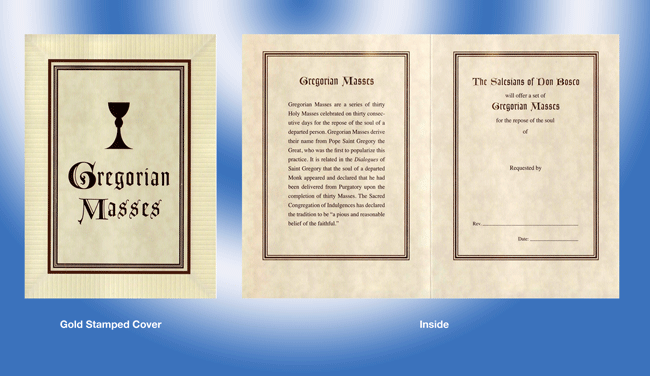

What they are and how you may have them said.
Gregorian Masses derive their name from St. Gregory the Great, the first Benedictine Pope who ruled the Church from the year 590 to 604. Gregorian Masses are offered for thirty (30) consecutive days for the repose of the soul of a particular person.
St. Gregory was the first to have a series of Masses said for a departed soul. The event that started this pious practice took place while he was abbot of St. Andrew's monastery in Rome, prior to his election to the papacy.
In the fourth book of his Dialogues, St. Gregory relates how one of the monks of his monastery, named Justus, did not keep his vow of poverty very well. When Justus died, St. Gregory feared that the good monk might have to spend a long time in Purgatory because of his failures with regard to poverty. He therefore ordered that the Holy Sacrifice be offered up for Justus for thirty consecutive days without a break. On the thirtieth day, Justus appeared to a brother monk telling him that he was now freed from his sufferings because of the thirty Masses St. Gregory had caused to be said for him.
Following St. Gregory's example, Catholic people throughout the ages have continued the pious custom of having thirty Masses said for their departed relatives and friends.
The Sacred Congregation on Indulgences has declared that "the offering of Gregorian Masses has a special efficacy for obtaining from God the speedy deliverance of a suffering soul, and that this is a pious and reasonable belief of the faithful."
Gregorian Masses may be offered only for the dead. They can be offered only for one particular person. The Masses must be said on thirty consecutive days, and if the series is broken, the priest who assumed the obligation must start all over again.
The usual offering for a set of Gregorian Masses is $300, as it does entail the serious obligation on the part of a priest to offer them without interruption.
Since Gregorian Masses may be offered only for the dead, they cannot be said for one who is still living. Nevertheless, one can, and is well advised to, arrange to have them said for oneself as soon as possible after death. All one needs to do is simply send a request to that effect to the Salesians of Don Bosco with the customary $250 offering. We, in turn, will send you a certificate to be kept among your important family papers with instructions that it be forwarded to the Salesians of Don Bosco immediately upon your death. As soon as we receive notice of your death, we will proceed at once to arrange the Gregorian Masses for you.
Due to the nature of Gregorian Masses (i.e. a priest being available to say 30 Masses on consecutive days) we normally have Gregorian Masses said by our missionaries in various parts of the world, thereby providing them with Mass intention that are very important to them and their missionary activities. For this reason no specific dates can be determined locally as to the exact date when any specific Gregorian Mass will be said. We can assure that the requested Masses will be said within ninety (90) days of the reported death of the person for whom the Gregorian Mass is to be said.
